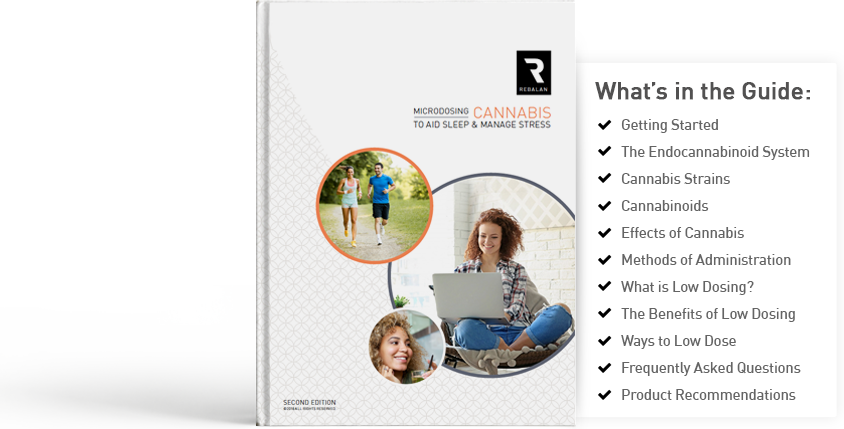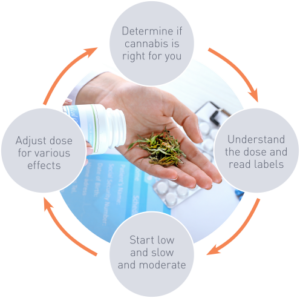 Low dosing cannabis is taking a dose of cannabis that contains 5mg or less of THC. This low dose offers greater control and mitigates side effects.
Low dosing cannabis is taking a dose of cannabis that contains 5mg or less of THC. This low dose offers greater control and mitigates side effects.
Many people acknowledge there probably is some role cannabis can play in helping to manage symptoms related to serious medical conditions, such as helping to mitigate the side effects of chemotherapy or reducing the frequency of debilitating seizures. By and large, however, most “mainstream” people do not see themselves as candidates for cannabis.
Cannabis in low doses is making a dramatic difference in the day-to-day lives of people suffering from anxiety and insomnia. Low doses reduce the psychoactive effects of the drug and help people manage stress and improve sleep.  And low-dose options are available in more traditional routes of administration, such as liquid tinctures and capsules. These forms of administration will seem more familiar to the drugs you are used to seeing dispensed in traditional pharmacies and retail outlets.
And low-dose options are available in more traditional routes of administration, such as liquid tinctures and capsules. These forms of administration will seem more familiar to the drugs you are used to seeing dispensed in traditional pharmacies and retail outlets.
The Endocannabinoid System
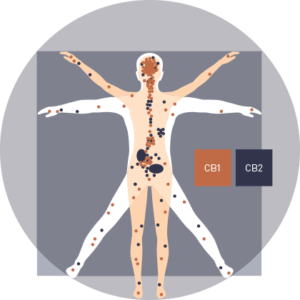 To start, it is important to understand how cannabis interacts with your body.
To start, it is important to understand how cannabis interacts with your body.
The endocannabinoid system (ECS) refers to the cell receptors that occur naturally within humans (as well as all vertebrates). The ECS promotes homeostasis. The two main types of receptors, CB1 and CB2, are found throughout the body, but generally speaking, CB1 centers on the nervous system and CB2 on the immune system.
Restrictions on cannabis research in the United States have resulted in very few clinical trials conducted domestically, but scientific teams in Great Britain, Spain, Italy, Israel, and elsewhere have confirmed cannabis has a place in the treatment of a wide range of health symptoms and conditions.
More than 36 states, including the District of Columbia, have laws supporting some type of medical marijuana application.
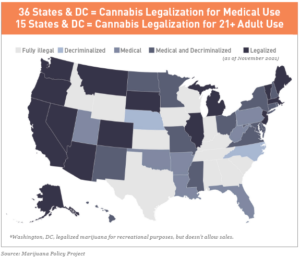
In low doses, cannabis is particularly effective as a way to manage daily stress and aid sleep. It is a good alternative for prescription medication, such as benzodiazepines (Xanax, Ambien) and SSRI’s (Lexapro, Paxil), which may present many unwanted side effects. Cannabis in low doses is also an excellent choice over alcohol for stress management, or to “take the edge off.”
Diet and exercise are better, but if you’re in the frame of mind where you are considering prescription medication, or drinking alcohol frequently, cannabis in low doses is worth a second look.
What about Addiction?
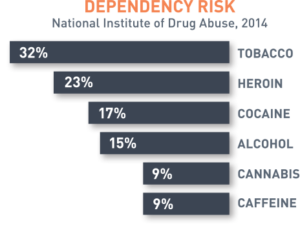 Because cannabis (except for products derived from hemp) remains federally illegal as a Schedule I drug under the Controlled Substances Act of 1970, the research is somewhat limited and the addictive qualities of marijuana are not fully understood.
Because cannabis (except for products derived from hemp) remains federally illegal as a Schedule I drug under the Controlled Substances Act of 1970, the research is somewhat limited and the addictive qualities of marijuana are not fully understood.
The National Institute on Drug Abuse estimates 9% of people who use cannabis will become addicted to it. Withdrawal symptoms include insomnia, anxiety and nausea – which is not surprising since these are symptoms you may want to treat with cannabis in the first place. Relative to alcohol, opiates and cocaine, the rate of addiction for cannabis is much lower.
An Alternative to Medication and Alcohol
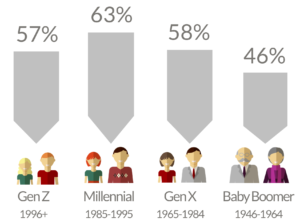
Alcohol and prescription medications have a range of side effects and possible health risks. Even heavy use of OTC medication can have negative health effects. Risks from drinking and medication use can include liver and kidney damage, depression, increased body weight, poor sleep, strokes, and heart attacks.
A recent report shows that cannabis users across every demographic decreased their use of medication and consumption of alcohol. Even 7% of users stopped consuming alcohol completely. If you use medication and/or drink regularly, consider if cannabis would be a healthier substitute for you. Consult your physician before altering any prescribed regimen.
Frequently Asked Questions
We get a lot of questions about cannabis, low dosing, side effects, etc. It’s impossible to cover them all but here is a summary of the more frequently asked questions.
What is cannabis?
Cannabis is a complex plant comprising 400+ chemical compounds, including 60+ cannabinoids such as THC, CBD and various terpenes. On a mature plan, the leaves and flowers can be consumed for physical and psychoactive effects.
What are the effects of cannabis?
As with any drug, including alcohol, the effects are variable and will depend on a number of factors such as dose, method of administration, concurrent drug use, individual metabolism, etc. It is difficult to generalize, but the primary effect of cannabis is a state of relaxation and a feeling of euphoria and happiness.
What is a low dose of cannabis?
This answer will vary drastically depending on who you’re talking to! Rebalan defines low dosing as a product containing no more than 5mg of THC. Many dispensaries will tell you a low dosing product is 10mg. For people new to cannabis, we recommend low dosing products that contain 2.5mg of THC or less per dose.
What is the difference between THC and CBD?
Cannabis is not a single drug. It is a complex plant comprising 400+ chemical compounds, including 60+ cannabinoids such as THC, CBD and various terpenes.
THC (tetrahydrocannabinol, also known as delta-9-tetrahydrocannabinol) gets a lot of press because it is thought to be the primary substance in cannabis driving “psychoactivity”. It’s the cannabinoid that “gets you high” – the concentration of THC in cannabis varies widely.
CBD (cannabidiol) is the major non-psychoactive cannabinoid found in cannabis. CBD decreases THC’s interaction with CB1 receptors, while itself while itself offering pain relief, anti-infammatory, anti-anxiety and anti-seizure effects. The typical cannabis plan has a very low concentration of CBD.
What are terpenes?
Terpenes make up another important category of cannabinoids. Terpenes are responsible for the varied fragrances of cannabis. They help balance the effects of THC and provide therapeutic benefits such as relieving gastrointestinal distress and combating anxiety.
Can I lose my job if I’m drug tested?
The short answer is yes. In June 2015, the Colorado Supreme Court affirmed a lower court ruling upholding the firing of an employee, a quadriplegic who smoked cannabis at home to control seizures and who failed a random drug test in 2010, citing the company’s zero-tolerance policy of drug use.
The supreme court held that the term “lawful” refers only to those activities that are lawful under both state and federal law. It is important to check your company’s policy regarding drug use. Read more about cannabis and drug testing.
What is medical cannabis?
Also called “medical marijuana,” medical cannabis is term that describes the application of cannabis to address a medical condition. It’s a bit arbitrary and it’s a legacy holdover from early advocacy and legislative efforts to raise the profile of cannabis as medicine. The “cannabis” flower is the same whether it is being used medically or recreationally.
How can you consume cannabis?
The most popular method for consuming cannabis is to smoke the flower of the plant. Generally speaking smoking cannabis produces less of a full body effect and this is the least reliable method for controlling the dose. If you are new to low-dosing, we recommend ingesting cannabis in the form of a low dose tincture, capsule or edible. The dose is controlled and the effects of ingesting cannabis in low doses are more subtle and longer lasting.
Can I be arrested for using it?
There has been a lot of development in this area through the Obama and Trump administrations but the bottom line is that cannabis (or marijuana) remains federally illegal as a Schedule I drug under the Controlled Substances Act of 1970. This means that technically you can face federal prosecution for possessing marijuana.
It is important to understand your local and state regulations in this area – though generally speaking (and in no way to be construed as legal advice), individual use in a state where marijuana is legal for medical or recreational purposes is probably a relatively low- risk activity, especially in the context of low dosing for stress and sleep.
What about quality?
Quality standards vary widely, and unfortunately, many products lack basic product labeling regarding active and inactive ingredients, dose and side effects. The product mix in the low-dose market segment is also not very well developed. Rebalan’s market research indicates approximately 1-2% of the market is the low-dosing segment. Can you guess why? Products in dispensaries by and large cater to people who want to get high or need much higher doses to treat serious medical conditions. It is even difficult to find products with 5mg of THC or less in states that permit recreational use. See the reviews page for Rebalan recommendations.
Can I drive while using cannabis?
Motor impairment related to cannabis use is a serious issue. As when you are taking any prescription medication or using alcohol, it is important to exercise extreme caution when using cannabis and avoid operating heavy machinery. Learn more about driving laws.
Content from our Blog
We have a strong point of view and regularly write about topics that are important to us. Check it out and let us know what you think!
Download the Guide
We’re not entirely with the group who sings the praises of cannabis for everything, but we’re convinced cannabis is worth a second look in microdoses to help manage stress and insomnia. Cannabis is also a great substitute for alcohol, with significantly fewer side effects in low doses. This guide is a resource to help you figure out if it’s right for you.
